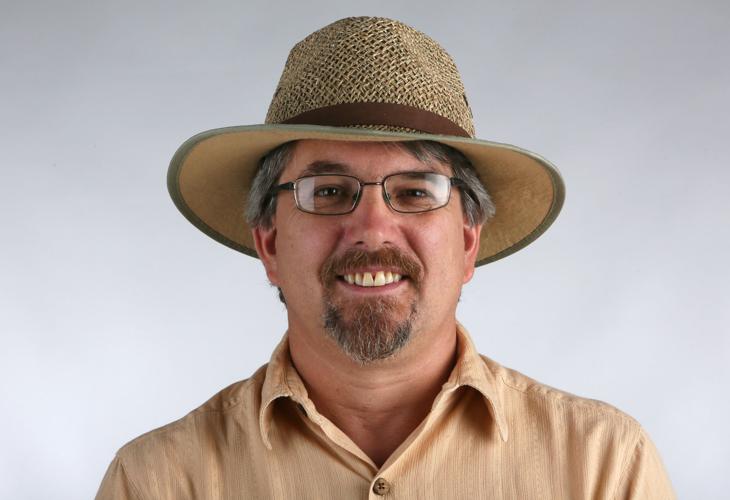Free and back home in Tucson after 42 years in prison, Louis Taylor eventually reverted to what he knew.
He hung around downtown.
That’s what he did as a kid. That’s also what he came to do in the four years after his release in April 2013, when he changed his plea to no contest in the 1970 Pioneer Hotel fire, which killed 29 people, and was released on a new sentence of time served.
Now Taylor is accused of going beyond that reversion to a childhood habit of hanging downtown and also taking up another old habit — crime. As a kid Taylor committed petty crimes. Now, as a near-senior-citizen, Tucson police say he robbed a frontage-road hotel while carrying a baseball bat. He’s charged with armed robbery, a felony.
Taylor remains in jail, and while he was amenable to an interview with me, he deferred to the wishes of his attorney, Pima County Public Defender Joel Feinman, who rejected my request.
This isn’t to say I’ve never talked to him. If you hung around downtown enough lately, you’d see Taylor, and he was happy to talk. More than once he introduced himself as “Louis Taylor, who they put in prison for 42 years for the Pioneer Hotel fire,” or some such explanation. He’d talk to anyone, but he’d also behave badly at times — he was banned from Johnny Gibson’s Downtown Market for suspected shoplifting.
The response to his arrest was pretty predictable. Feinman and other members of his legion of supporters noted that Taylor couldn’t have been expected to make an easy transition to life as a free man after spending some of his formative years, plus decades more, in prison.
“It really just shows the terrible effect the criminal justice system can have,” Feinman told my colleagues last week.
Feinman elaborated when I spoke with him this week in his office overlooking the Pioneer: “We’re not a society that embraces felons, even if your felony was a DUI or a beer run. You’re a felon for life in Arizona.”
Feinman and others — even prosecutor Rick Unklesbay, who has remained convinced of Taylor’s guilt in the Pioneer fire — say there simply isn’t enough support for inmates transitioning out of prison.
“Way too many people are coming out of prison without any skills, without any support when they get out,” Unklesbay said. “They don’t have any place to live, don’t have any relatives. There’s no widespread support system.”
That’s true in the broad sense, but let’s get real about Taylor. He was given an opportunity, he was given support, he was given warnings, and he blew it anyway, if the police are right about him.
This was not a great surprise. Even on the day of his release, the son of one of the victims of the fire, Paul d’Hedouville II, told Taylor, “Do as you choose Mr. Taylor. But choose wisely. Do not waste your new beginning.”
I spoke with d’Hedouville on Tuesday, and he told me this was not an idle comment. He was worried Taylor would waste this chance, even though he had broad support.
Donors gave thousands of dollars to the Arizona Justice Project to help him after his release. His rent was paid for. He was offered jobs. They gave him bicycles.
And just as quickly, it seemed, Taylor moved out of the apartments, quit the jobs and lost or gave away his bicycles.
Just a year after Taylor’s release, in 2014, my former colleague Kim Matas reported that “he has stubbornly resisted taking advice from those people closest to him who try to help.”
As interest in his case waned, the problems grew. But he continued to have community support, said Andy Silverman, a UA law professor who helped resolve the criminal case and helped support Taylor, along with his wife, Starr Sanders.
“I don’t think people dropped him,” Silverman said. “It’s just that Louis many times wanted to do it his own way. Sometimes that was fine, other times it did not turn out fine.”
At the library plaza downtown Tuesday morning, I spoke with a down-on-her-luck Irish immigrant who goes by the name Cassandra, who had gotten to know Taylor hanging around at Ronstadt Transit Center over the past couple of months. She got the same story about how he was the guy wrongly imprisoned for the hotel fire.
She bought him a sandwich at Johnny Gibson’s because he couldn’t go in there anymore.
“He was living on the streets. He was getting by hand-to-mouth every day.”
It sounds a lot like the Louis Taylor of the 1960s and 1970s, getting by on his wits and unable, uninterested or unwilling to live a straight life with a job and a regular home.
“He became a street person in downtown Tucson,” Silverman said. “That’s what he was before he went into prison. He was a street kid in downtown Tucson.”
And a petty criminal. He was that, too. And he’s accused of turning into that again.
So maybe prison is to blame for Taylor’s inability to thrive as a free man. Or maybe the blame isn’t on the system, but on the tough upbringing that had already formed the street kid who was in the Pioneer Hotel that awful day in December 1970. And on Taylor himself for being unable to use the help he was offered.







